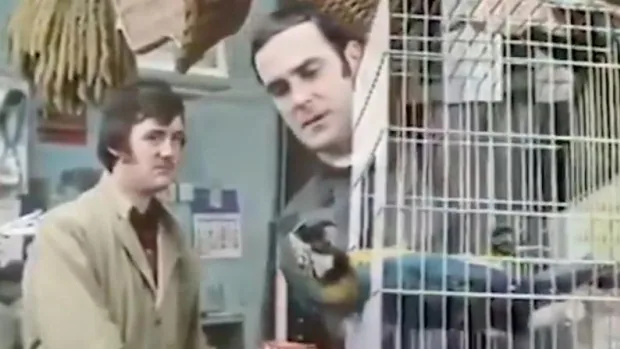Hours after a CBC News story highlighted Canada’s judicial love affair with Monty Python, a B.C. judge excised all references to the British comedy troupe’s iconic “dead parrot” sketch from a class-action certification decision in B.C.

It is an ex-reference.
It has ceased to be.
Days after a CBC News story highlighted Canada’s judicial love affair with Monty Python, a B.C. judge has removed all references to the British comedy troupe’s iconic “dead parrot” sketch from a recent class-action certification decision in B.C.
When it was first published on Monday, B.C. Supreme Court Justice Ward Branch’s ruling in Krishnan vs. Jamieson Laboratories et al began with a wholesale rendering of the 1969 BBC television skit in which an irate Mr. Praline confronts a shifty shop owner over the purchase of a Norweigian Blue parrot that appears to have “shuffled off its mortal coil.”
Branch went on to compare plaintiff Uttra Kumari Krishnan to Mr. Praline — played in the sketch by John Cleese — in her search for justice over the sale of glucosamine sulfate products that allegedly don’t contain glucosamine sulfate.
“Much like the poor Mr. Praline, [Krishnan] complains that she was sold a health product that did not contain what it said on the bottle,” Branch wrote.
The “corrected judgment,” which replaced the original ruling Friday, makes no mention of Mr. Praline or the parrot.
‘Not common to see jokes edited out’
The original decision vanished from the court’s website within hours of the publication of the CBC story, which was widely circulated.
Branch gave no reasons for the correction.
University of Ottawa associate law professor Amy Salyzyn, who heads the Canadian Association for Legal Ethics, said that beyond the humorous backdrop, the ruling revision raises some serious questions.

She said judges often amend decisions to correct spelling and dates and to adhere to the requirements of publication bans. Mistakes happen to everyone.
“But I question whether it is appropriate to edit a judgment to remove a joke that is subsequently regretted,” Salyzyn told CBC News in an email.
“One way to look at a poor attempt at judicial humour is as an error of judgment by the judge, and there is arguably public interest in being transparent and allowing the public to see that error. It is certainly not common to see jokes edited out of judgments.”
Comedic plumage plucked
The decision in question gave the go-ahead to Krishnan to bring a class-action lawsuit against the manufacturers of a number of products that claim to contain glucosamine sulfate — purported to be a relief for osteoarthritis.
According to the ruling, scientific tests allegedly found no glucosamine sulfate in a bottle of Webber Naturals Glucosamine Sulfate 500 mg capsules.
The manufacturers dispute the claim and say they passed Health Canada’s testing protocols for glucosamine sulfate — a line of argument that originally led to the judge’s second dead parrot analogy.

“Health Canada’s testing protocols cannot change a dead parrot into a live one,” Branch wrote in the first decision.
The judge plucked the comedic plumage from that portion of the amended ruling, which now reads: “Determining whether a product ‘is what it says it is’ is a material issue, regardless of Health Canada’s regulatory framework.”
A spokesperson for the court did not return a request for comment Friday.
Humour ‘fraught terrain’ for judges
The excision of the joke means Branch’s ruling will no longer form part of a dead parrot precedent revealed by a CBC search of the Canadian Legal Information Institute database.
Judges at both federal and provincial levels have cited Monty Python — and the dead parrot sketch in particular — in cases dealing with both misrepresentations and defunct entities.
The Canadian judiciary appears to have a fondness for the group, whose original members — Cleese, Eric Idle, Michael Palin, Graham Chapman, Terry Jones and Terry Gilliam — created the Flying Circus TV show, broadcast on the BBC between 1969 and 1974.

The group had a passionate following in Canada, the setting for another of its best-known satires, The Lumberjack Song, which features the refrain “I’m a Lumberjack and I’m OK.”
A search of the Australasian Legal Information Institute’s rulings reveals a similar love of Monty Python references among judges in Australia, a country whose outback philosophers were featured in the group’s so-called The Bruces’ Song.
In 2016, a judge in Melbourne accused a school district of acting like both the dead parrot shopkeeper and a knight from the 1975 film Monty Python and The Holy Grail, who said “it’s only a flesh wound” after having his limbs cut off.
A much-cited book on defamation law in Australia also points to a line from The Holy Grail as an example of speech that is abusive but not defamatory: “Your mother was a hamster and your father smelt of elderberries.”
The University of Ottawa’s Salyzyn suggests a lesson may be found in the B.C. dead parrot reference that, in the words of the sketch, “is no more.”
“A judge is in fraught terrain when attempting humour,” she said. “The better practice may be to just leave jokes out of written decisions.”

